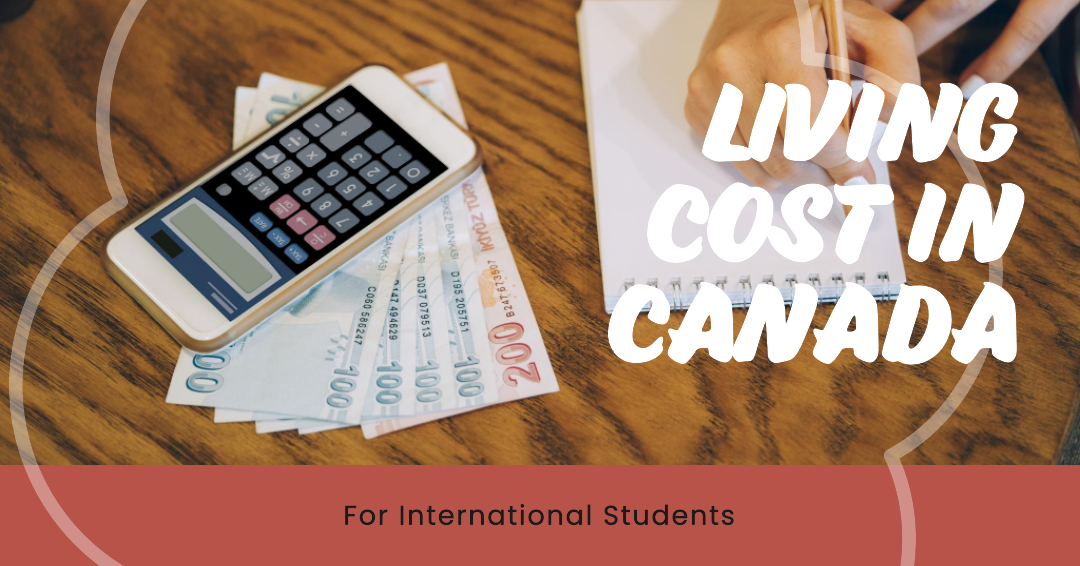- BY admin
- POSTED IN Blog, Study Guide
- WITH 0 COMMENTS
- PERMALINK
- STANDARD POST TYPE

Living Cost in Canada for International Students
Canada is a popular and favourite destination for international students who want to pursue higher education in a diverse and multicultural country. However, studying abroad can also be expensive, especially if you are not familiar with the cost of living in Canada. In this blog post, we will provide some information and tips on managing your living expenses in Canada as an international student.
Cost of Living in Canada
One factor affecting your living cost in Canada is the city you choose to study. Some cities are more expensive than others, depending on the demand for housing, transportation, food, and other services. According to the 2023 Mercer Cost of Living Survey, the most expensive city in Canada is Toronto, followed by Vancouver, Montreal, Calgary, and Ottawa. On the other hand, some of the least expensive cities in Canada are Quebec City, Halifax, Winnipeg, Saskatoon, and Edmonton. These cities offer lower rents, cheaper groceries, and more affordable public transportation than the bigger cities.
Monthly Expenses in Canada.
Another factor that influences your living cost in Canada is your monthly expenses. These include accommodation, food, transportation, utilities, entertainment, and other personal expenses. An international student’s average monthly expenses in Canada can range from CAD 1,807 to CAD 2,868, depending on your chosen accommodation. Here is a breakdown of the average monthly expenses in Canada for an international student:
Accommodation: This is usually the biggest expense for international students in Canada. The accommodation cost depends on whether you live on-campus or off-campus and whether you share a room or apartment with other students or live alone. On-campus accommodation can cost between CAD 550 to CAD 1,611 per month, while off-campus accommodation can cost between CAD 600 to CAD 1,500 per month.
Food: This is another major expense for international students in Canada. The cost of food depends on your eating habits and preferences. If you cook at home or use the meal plan provided by your university or college, you can save money on food. The average cost of food in Canada for an international student is around CAD 720 per month.
Transportation: This is a variable expense for international students in Canada. The cost of transportation depends on how far you live from your campus and how often you travel within or outside the city. If you use public transportation, such as buses, subways, or trains, you can get a monthly pass that can cost between CAD 80 to CAD 150 per month. If you use a car or a taxi, you must pay for gas, insurance, parking, and maintenance fees.
Utilities: This is a fixed expense for international students in Canada. The cost of utilities includes your electricity, water, gas, internet, phone, and cable bills. The average cost of utilities in Canada for an international student is around CAD 180 per month.
Entertainment: This is a discretionary expense for international students in Canada. The cost of enjoyment depends on your hobbies and interests. If you like to go out with friends, watch movies, visit museums, or join clubs and societies, you must budget for these activities. The average cost of entertainment in Canada for an international student is around CAD 60 per month.
Other personal expenses: These are miscellaneous expenses for international students in Canada. Other personal expenses include clothing, toiletries, books, stationery, healthcare, and travel insurance. The average cost of other personal expenses in Canada for an international student is around CAD 200 per month.
What Makes Canada Expensive
Canada is a developed country with a high standard of living and quality of life. However, this also means that some things are more expensive than in other countries. Some of the factors that make Canada expensive are:
Taxes: Canada has a progressive tax system, meaning that the more income you earn, the more taxes you pay. The federal income tax rate ranges from 15% to 33%, depending on your income bracket. In addition, you also have to pay provincial or territorial income taxes, which vary by province or territory. The provincial or territorial income tax rate ranges from 4% to 21%, depending on your income bracket and location.
Education: Education is one of the most important investments you can make for your future. However, It also comes with a price tag. The average tuition fee for international undergraduate students in Canada is around CAD 36, 100 per year, while the average tuition fee for international graduate students is around CAD 21, 100 per year. These fees do not include other costs such as books, supplies, and student fees.
Healthcare: Healthcare is one of the benefits of living in Canada, as it offers universal health coverage to all Canadian citizens and permanent residents. However, This does not mean that healthcare is free. You still have to pay for some services and products not covered by the public health insurance plan, such as prescription drugs, dental care, eye care, and physiotherapy. You must also pay for your health insurance if you are an international student or a temporary resident. The average cost of health insurance for international students in Canada is around CAD 600 per year.
What Makes Canada Cheap for International Students
Despite the high cost of living in Canada, some factors make Canada cheap for international students. Some of these factors are:
Scholarships: Scholarships are a great way to reduce your education costs and ease your financial burden. Many scholarships are available for international students in Canada, offered by the federal and provincial governments, universities and colleges, and other organizations and foundations. Some scholarships are based on academic merit, while others are based on financial need, community involvement, or other criteria. You can search for scholarships online or contact your university or college for more information.
Work opportunities: Work opportunities are another way to earn extra income and gain valuable work experience while studying in Canada. As an international student,
you can work on-campus or off-campus for up to 20 hours per week during regular academic sessions and full-time during scheduled breaks, such as winter and summer holidays. You can also apply for a post-graduation work permit (PGWP) after completing your studies, which allows you to work in Canada for up to three years, depending on the length of your program.
Student discounts: Student discounts are a perk of being a student in Canada, as they can help you save money on various goods and services. You can get student discounts on public transportation, museums, cinemas, restaurants, and more by showing your student ID card or using a student discount app such as SPC or ISIC. You can also get discounts on flights and travel packages using websites such as StudentUniverse or STA Travel.
Canada Changed Student Working Hours
One of the recent changes that Canada made for international students is the increase in the maximum number of hours they can work per week. Due to the COVID-19 pandemic, many international students faced financial difficulties and challenges finding work opportunities. To support them, the Canadian government temporarily removed the limit of 20 hours per week for international students. Students who work in essential services or functions, such as health care, food production, or transportation. This means that international students who work in these sectors can work more than 20 hours per week without affecting their study permit status. This measure is effective until August 31, 2023.
Conclusion
If you need any assistance or guidance with your study abroad plans you can contact UNI GUIDE, one of the best consultants in Lahore and Pakistan. We offer services for international students who want to study and make a career abroad. We can help you achieve your dream university in Canada. We offer you personalized counseling, admission support, visa guidance, scholarship assistance, and pre-departure orientation. Contact us today and let us help you make your dream of studying abroad come true!








































